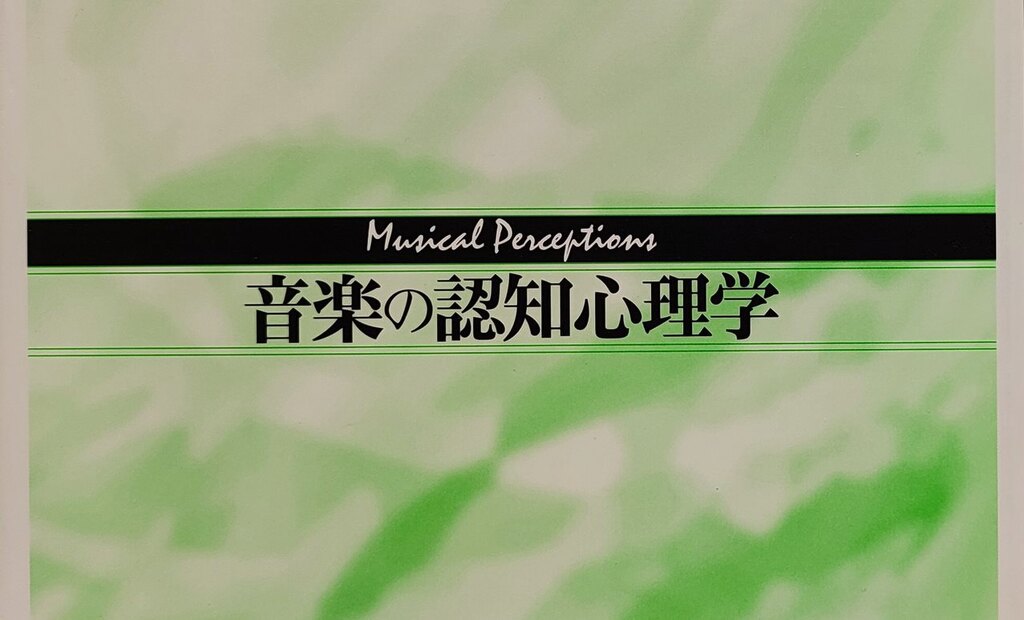(Original posted on April 10, 2002)
This is a collection of research papers on the theme of music by experts in cognitive psychology, pedagogy, and aesthetics. The chapters on pedagogy, in particular, have a strong flavor of reports from the front lines of psychological experiments, offering a glimpse into the actual practice of the psychological approach to music.
Although this book is positioned as an “introductory text in this field,” it is generally highly specialized and is aimed at those with an interest in and knowledge of psychology. I believe you can grasp the book’s outline in more detail by looking at the table of contents.
◇
This book seeks to explore the mystery of “how people perceive and cognize music” by questioning it from the side of psychology. Its content introduces the current achievements and problems in psychology, pedagogy, aesthetics, and acoustics. You can read detailed research by various authors, including Rita Aiello.
For example, the content of “Chapter 3: Perception” by Nicholas Cook is particularly intriguing from the perspective of a music creator. In response to the saying that “music theory is a branch of psychology,” for instance, regarding the correlation between music and emotion, Cook challenges this with a counterargument, lamenting that “psychologists only see music as a collection of notes and do not consider its meaning.”
The relationship between emotion and music is something composers cannot ignore, and for some, this relationship may exist without their being conscious of it. Given the fact that music moves people’s psychological state, it is necessary to confront this “with both mind and heart.” I believe this book serves as an excellent guide for confronting it more deeply.
Furthermore, “Chapter 7: Melodic Contour and Melodic Memory” discusses the importance of the concept of melodic contour in how people recognize and remember melodies. The subsequent “Chapter 8: The Mental Representation of Tonality in Music” discusses the mechanism by which the “sense of tonality” is established when people listen to tonal music. Both are interesting topics from a creator’s perspective as well.
More information about the book
Title (Japanese) :『音楽の認知心理学』
Author : リタ アイエロ (編集)
ISBN : 4414302838
Table of Contents for “Musical Cognition”
- Preface / Acknowledgments / Preface to the Japanese Edition
- Part I: Philosophical Perspectives
- Chapter 1: Emotion and Meaning in Music
- Introduction / Past Stances on the Nature of Musical Experience / The Nature of Emotional Responses to Music and Arguments for Their Existence / Psychological Theories of Emotion / A Theory of Emotion in Musical Experience / Musical Meaning
- Chapter 1: Emotion and Meaning in Music
-
- Chapter 2: Music and Language – Similarities and Differences
- Introduction / Similarities Between Music and Language / The Phonology of Music—A Comparison with the Phonology of Language / The Syntax of Music—A Comparison with the Syntax of Language / Listening to Music—Where is the Meaning? / Information Theory / Summary
- Chapter 2: Music and Language – Similarities and Differences
-
- Chapter 3: Perception – A Perspective from Music Theory
- Introduction / Music and Psychology—A Troubled Relationship? / Do People Hear Tonal Structure? / The Psychology of Music? Or the Psychology of Ear Training? / A Theory of Music? Or a Theory of Mind? / Does Theory Reflect or Challenge Music Perception?
- Chapter 3: Perception – A Perspective from Music Theory
- Part II: Developmental Perspectives
- Chapter 4: The Singing of Children and Adults – A Developmental Approach to Music
- Introduction / Musical Talent—Innate Ability or a Developmental Process? / Development—Constructing Knowledge / Stages of Musical Development—Expert Views / Operational Thinking—Cognition and Regulation in Performance / Knowledge of Tonality—Contour Schemas, Standard Songs, and Scales / Representing Knowledge—The “Felt Path” or a Formal System / The Singing of Preschool Children—Constructing Basic Representational Forms / The Development of Pitch Relations / Song Collection and Database Creation / Constructing the First Boundaries of Tonal Space / Encountering Culture—Childhood and Beyond / Song in Culture—Toward Operational Knowledge / Musical Study—A Continuing Developmental Path / Development and Talent
- Chapter 4: The Singing of Children and Adults – A Developmental Approach to Music
-
- Chapter 5: Coming to Hear in New Ways
- Introduction / Knowing and Doing / Making Meaning / About My Research Methods / How to Think About the Paradox / Hearing in Different Ways / Until Met and Mot Come to Understand Each Other’s Hearing / About Our Dialogue / Summary
- Chapter 5: Coming to Hear in New Ways
-
- Chapter 6: Musical Performance – Expression and the Development of Excellence
- Introduction / Expressive Performance / The Development of Excellence in Performance / Conclusion
- Chapter 6: Musical Performance – Expression and the Development of Excellence
- Part III: The Cognition of Melody, Tonality, Rhythm, and Timing
- Chapter 7: Melodic Contour and Melodic Memory
- Introduction / What is Melodic Contour? / The Importance of Melodic Contour—Experimental Evidence / The Role of Tonality / Memory for Melodic Contour / Summary
- Chapter 7: Melodic Contour and Melodic Memory
-
- Chapter 8: The Mental Representation of Tonality in Music
- Introduction / “Pitch” Relations / Harmonic Context / Tonal Context / Research on Key Identification / Summary
- Chapter 8: The Mental Representation of Tonality in Music
-
- Chapter 9: Tonality and Expectation
- Introduction / Tonality-Based Expectation and the Aesthetic Experience / The Puzzle of Tonality-Based Expectation / Expectation and Mental Representation / Measuring Schematic Expectation / Expectation and the Tonal Hierarchy / Can Schematic Expectation Be Explained by Sound Structure or Auditory Physiology? / How Can Tonality-Based Expectation Be Learned?—Modeling with Neural Networks
- Chapter 9: Tonality and Expectation
-
- Chapter 10: The Perception, Production, and Imitation of Time Ratios by Skilled Musicians
- Introduction / Three Experimental Tasks in the Psychophysics of Time / Perception Judgments of 1/x Beats / Production of 1/x Beats / Additional Analysis of Perception Judgments / Additional Analysis of Production / Production of Multiple Subdivisions of a Beat / Conjectures on Why the Feedback Model of Production Failed to Predict / Imitation of 1/x Beats / A Model Representing the Flow of Information in the Perception, Production, and Imitation of 1/x Beats / Summary
- Chapter 11: Interpretive Elements in Performance
- Introduction / Experimental Data / Discussion
- Chapter 10: The Perception, Production, and Imitation of Time Ratios by Skilled Musicians
- Part IV: The Perception of Musical Works
- Chapter 12: The Possibilities of Experimental Research on Music Listening
- Introduction / The Influence of Psychoacoustics / The Influence of Psycholinguistics
- Chapter 12: The Possibilities of Experimental Research on Music Listening
- Original Notes / Bibliography / Supervising Editor’s Afterword / Index / About the Original Contributors / About the Translators
About the Author
Rita Aiello
After graduating from the Manhattan School of Music with a major in piano, she majored in music education and psychology at Columbia University’s graduate school. Doctor of Education. Currently, an associate professor at the Aaron Copland School of Music, Queens College, City University of New York. Professor at The Juilliard School. She teaches the cognitive psychology of perception in music. (Quoted from this book)


